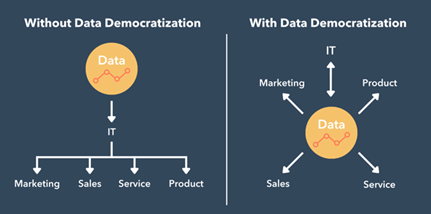What is Data Democratization?

Image source: Hubspot
A growing challenge for most companies is getting access to meaningful information from their data when they need it. Why? Either IT centrally controls data access or data is managed within each respective business unit. While this makes things simple from a logistical perspective, it means not everyone within the organization has access to the data (or access in a timely manner) which can hamper decision-making.
Because of this, you may have recently heard the term Data Democratization. Data democratization is the principle of making company data easily accessible to all members of an organization. The goal is to empower data users from all departments and disciplines to uncover insights in the data, using that data to make better decisions and secure an advantage over competitors.
Should your organization be democratizing data access?
According to a recent survey done by Informatica, 42% of CDOs are prioritizing investments in capabilities that will enable effective data sharing, democratization, and use. Data democratization can help organizations achieve the following:
- Inclusive decision making: Data democratization breaks down traditional data siloes, enabling employees across departments to access and interpret data. This promotes cross-functional collaboration and empowers stakeholders to make data-driven decisions base on accurate, up-to-date insights.
- Reduced Dependency on IT: Traditional data workflows are often heavily dependent on IT departments, many of which are overburdened with other tasks. By democratizing data access, non-technical employees can perform their own analyses, freeing up IT resources for higher value tasks. This also improves efficiency as teams get faster access to data.
- Enhanced Data Literacy: Data democratization drives a wider shift within organizations, helping more employees become data literate through exposure to data platforms and tools.
- Agile & Innovative Problem Solving: By making data accessible to more individuals, there is more visibility and analysis from differing perspectives on each data set. This makes it more likely that trends, anomalies, and areas of improvement will be spotted, leading to quicker responses.
What else should your organization consider?
Before embarking on the journey of expanding data access, it’s important to ensure that your organization is prepared. Before making changes, you’ll want to review your data security and privacy policies, ensure you have data governance procedures in place to manage information effectively, and check that your organization has the necessary hardware, software, and network infrastructure in place to support data democratization. It’s also important to invest in employee training on the fundamentals of working with data and imbed the importance of data management into your organization’s culture. There’s limited value in opening up data access if nobody knows what to do with the information!
We expect to see the trend towards data democratization continue in the years to come as leading enterprises gain a competitive edge from the practice. Economic uncertainty also means that there will more companies vying for the attention of fewer customers, making data democratization a worthwhile investment.
